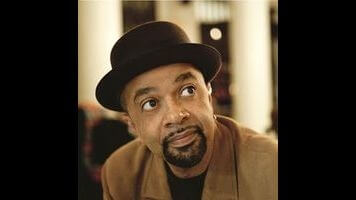Kill ’Em And Leave, James McBride’s slender new book about James Brown, falls somewhere between a biography of its elusive subject, a personal history of its very open author, an artistic consideration of one musician by another, and an angry and heartfelt look at the ways black culture is co-opted, omitted, or manipulated in popular narratives, the ways it is used and abused. A figure as pivotal as Brown can be viewed in any way, used to service anyone’s viewpoint. “There’s lots of versions of the story,” McBride writes. “A white version, a black version, a historical version, a record-company version. There’s even an official version in [Brown’s] biography.” Each face of the prism not only reveals a new image but skews the others; Kill ’Em is McBride’s attempt to find the source, to grapple with a key figure of popular culture and a country that didn’t know how to deal with him. The book’s subtitle is, “Searching For James Brown And The American Soul.”
This, he admits up front, is a doomed endeavor. He quotes Brown’s lawyer: “You did not get to know James Brown, because he did not want to be known.” Kill ’Em puts this unknowability at its core, probing both the man and the gravitational pull of his void, returning to key events of Brown’s life and legacy, moments that seem like they must explain something: Brown refusing a gift from an African dictator, the violence he inflicted on his wives, the $100 million donation he left to poor Southern children, that never reached its intended beneficiaries. “The short answer is greed,” McBride sighs. “The long answer is boring, which is how lawyers like it.”
McBride has been working toward this book his whole life. He grew up near Brown, and writes of his envy when one of his sisters worked up the courage to knock on the man’s door (and was greeted warmly). Brown’s saxophonist was a direct inspiration, igniting a passion for the instrument that continues to this day. (In addition to being an accomplished musician, McBride is a journalism professor at New York University, where this writer was one of his students.) Some of the book’s most interesting sections have McBride explaining the similarities and differences between funk and jazz, or performing musical autopsies on Brown’s work and showmanship (the title refers to Brown’s leave-on-a-high-note philosophy of entertainment).
Kill ’Em also continues McBride’s career-long focus on the legacy of racism, which hit a recent high point with the National Book Award-winning The Good Lord Bird. This inquiry began with The Color Of Water, his high-school-staple memoir about growing up as one of 12 kids under a Jewish mother and a black father, but despite Kill ’Em’s autobiographical elements, its closest ascendant may be his 2008 novel Song Yet Sung. That work revolved around an escaped slave who is tortured by premonitions of the future, a device McBride used to consider where African-American life would go after emancipation, in ways both good (the Civil Rights movement) and bad (gang culture). Here, it’s as though McBride himself is tortured by the past, by the unfulfilled promise of Brown’s passions:
It’s reflective of the sad state of the American popular emporium these days, where for the last decade talent shows judged by stars whose names we’ll forget five minutes past breakfast decide who has “talent” in America, while songs like “Bitch Better Have My Money” climb the charts. Maybe that’s the kind of song we always wanted. Maybe it’s the song we all deserve. But it wasn’t the song Brown had in mind.
With each successive book, McBride’s writing has become more casually lyrical, with none of the stiltedness that hampered early works like Miracle At St. Anna. Kill ’Em features some of his best and most beautiful passages. Still, as the excerpt above illustrates, it is also marked by a tone of frustration that fluctuates in how righteous it feels. The anger over Brown’s unfulfilled endowment is understandable, as are McBride’s thoughts on diversity (“America likes its black stars one at a time”). But that’s offset by moments when he notes how Brown touted education and adds, “It’s hard to imagine seeing many of today’s major African American stars comporting themselves that way onstage, or staying so close to the communities that produced them.” About the James Brown Academy Of Musik Pupils (founded with the money Brown left for children), he remarks, “Not math. Not science. But the funk. Just what poor kids need.”
It’s easy to read this as crankiness more than insight, and McBride doesn’t exactly dissuade detractors by admitting he took on the book because he needed money after a divorce. But the tone is a deliberate choice, used for a serious purpose: McBride’s subject isn’t just one of the pivotal figures of 20th-century culture, but the proud black man, in his estimation. What do Brown’s personal failings mean in that context? Does it matter that Brown’s sound proved most lasting than what he tried to do from a cultural or political standpoint? What does it mean that Brown’s legacy has been taken advantage of in the way it has been? “The James Brown story is not about James Brown,” McBride writes. “It’s about who’s getting paid, whose interest is involved, who can squeeze the estate and black history for more.”









































